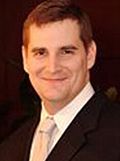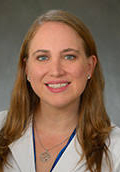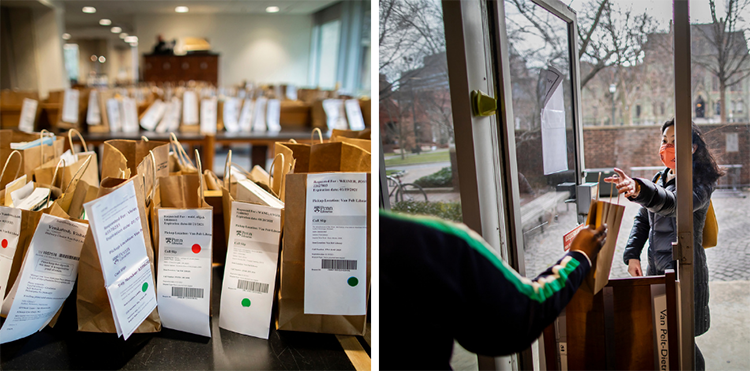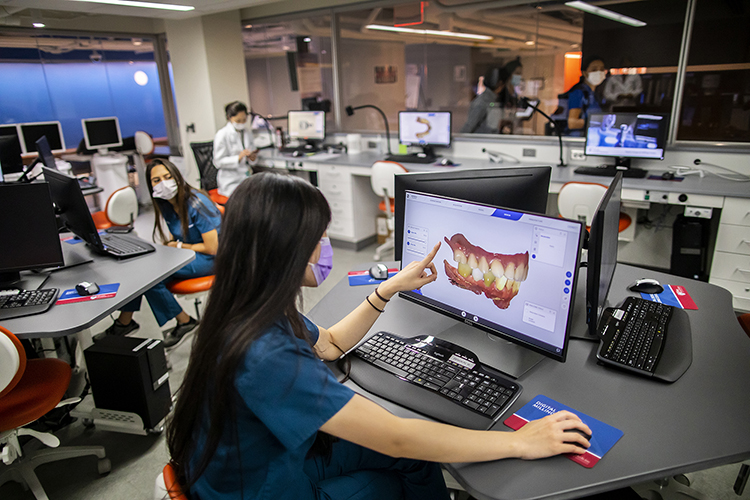$6.3 Million Gift from Alumnus David S. Pottruck to Penn Athletics
 On January 27, the University of Pennsylvania announced a $6.3 million leadership gift from alumnus David S. Pottruck, C’70, WG’72, reinforcing his half-century of engagement with Penn Athletics. The majority of his commitment to the Set The Future In Motion campaign will establish an endowment in an area of passion for him, leadership development. Mr. Pottruck’s endowment gift to the Penn Athletics Wharton Leadership Academy will provide funding in perpetuity to a program that will shape Quaker student-athletes for generations to come. The Penn Athletics Wharton Leadership Academy currently falls under the purview of the Center for Student-Athlete Success (CSAS), which in recognition of Mr. Pottruck’s incredible generosity will be renamed the “Pottruck Center for Student-Athlete Success.” His daughter, Stephanie Pottruck Goldman, C’99, and son-in-law, Aaron Goldman, W’99, were inspired by his philanthropy and they too made a financial commitment to CSAS in honor of Mr. Pottruck, bringing the total to over $7.1 million between the two gifts.
On January 27, the University of Pennsylvania announced a $6.3 million leadership gift from alumnus David S. Pottruck, C’70, WG’72, reinforcing his half-century of engagement with Penn Athletics. The majority of his commitment to the Set The Future In Motion campaign will establish an endowment in an area of passion for him, leadership development. Mr. Pottruck’s endowment gift to the Penn Athletics Wharton Leadership Academy will provide funding in perpetuity to a program that will shape Quaker student-athletes for generations to come. The Penn Athletics Wharton Leadership Academy currently falls under the purview of the Center for Student-Athlete Success (CSAS), which in recognition of Mr. Pottruck’s incredible generosity will be renamed the “Pottruck Center for Student-Athlete Success.” His daughter, Stephanie Pottruck Goldman, C’99, and son-in-law, Aaron Goldman, W’99, were inspired by his philanthropy and they too made a financial commitment to CSAS in honor of Mr. Pottruck, bringing the total to over $7.1 million between the two gifts.
“I am extremely grateful for Dave Pottruck’s leadership and philanthropy,” said Penn President Amy Gutmann. “His generosity has spanned the decades and touched countless members of the Penn community. With this landmark gift, Dave is providing critical support for student-athletes that will benefit them in their athletic and academic endeavors, as well as far into their careers. The Pottruck Center for Student-Athlete Success is a testament to Dave’s visionary leadership and profound recognition in the importance of investing in future thought leaders. My thanks as well to Stephanie and Aaron for following Dave’s lead in this important area.”
Five million dollars of Mr. Pottruck’s gift will establish an endowment that will ensure a baseline of funding for the Penn Athletics Wharton Leadership Academy in perpetuity while enhancing the offerings of the Center for Student-Athlete Success. The positive impact that CSAS will have on Penn’s student-athletes will forever positively impact the trajectory of their lives. Student-athletes will develop the mental, spiritual, and social skill sets that will ultimately position them to make significant contributions to the world long after graduation.
“The gift is a way for Penn Athletics to prioritize the importance of leadership education, while supplementing this important discipline with critical development areas such as civic engagement and academic support and vice versa,” said Mr. Pottruck. “I’m thrilled that my philanthropic interest in Penn has been passed down a generation and has motivated Stephanie and Aaron to make a significant contribution to Penn Athletics. To know that our family name will forever be aligned with the shared areas of importance to Penn and the Pottrucks and Goldmans is extremely gratifying and humbling.”
“Athletics has always been important to our family,” Mrs. Goldman said. “We love the competition aspect, but we have always been strong believers in the skills that being part of a team and working toward a shared goal teaches young people. Aaron and I are thrilled make this gift in honor of my father to a dedicated area within Penn Athletics that will develop and nurture these important skills for generations of Penn student-athletes.”
M. Grace Calhoun, the T. Gibbs Kane, Jr., W’69, Director of Athletics and Recreation, underscored the critical importance of investing in people and programs as it relates to the maturation of student-athletes. “Dave Pottruck has been as loyal a supporter as Penn Athletics has and as a result of his most recent gift, Penn will be better positioned to deliver on our promise of providing our student-athletes with an unrivaled academic and athletic experience, while developing them into our leaders of tomorrow,” said Dr. Calhoun. “Dave’s investment in the whole person is truly remarkable and catapults Penn Athletics toward being a national leader in this space. We are incredibly thankful to Dave, Stephanie and Aaron for their leadership and this transformational gift.”
Mr. Pottruck is not only supporting broad-based programming for all Penn student-athletes, but also is focused on assisting the football and wrestling programs—two sports that had an incredible impact on him during his formative years at Penn. As an undergraduate, he was a member of the varsity football and wrestling teams and has made this gift to not only provide annual financial support to two programs close to his heart, but also to motivate others to join him to ensure that both teams have proper operational funding now and in the future. During this time of economic uncertainty, Mr. Pottruck’s gift is a leadership statement centered on supporting our varsity programs when they need it the most.
In making this gift, Mr. Pottruck, a former Penn Trustee, emeritus member of the Division of Recreation and Intercollegiate Athletics Board of Advisors, and former Global Chief Executive Officer at Charles Schwab, is supporting an area that played a major role in his professional success. Mr. Pottruck credits his athletic experiences as providing him the personal infrastructure and skills to lead a global leader in finance such as Charles Schwab. He understands the importance of giving back in an effort to help nurture the next generation of leaders.
“My years in business have repeatedly demonstrated to me how important it is to develop future leaders,” Mr. Pottruck said. “Leadership is a quality that can, and should, be taught. The combined stamina, discipline and team spirit that Penn’s athletes show so consistently demonstrates their enormous potential as world leaders. The Leadership Academy program will help them move seamlessly and successfully into the future.”
“As a former wrestler at Penn myself, I have always admired Dave Pottruck as a leader and a mentor for my own development and to know that the lessons he has taught me over the years will be shared with all our student-athletes through our partnership with the McNulty Center at Wharton is incredibly exciting,” said Matt Valenti, C’07, Associate Athletics Director for Student-Athlete Success. “Moreover, to have the physical office that I work in carry the Pottruck name going forward is not only personally gratifying but will also be motivating for our student-athletes for years to come.”
Set The Future In Motion: The Final Year Of Game Onward is a $150 million fundraising effort that has a focus on annual, endowment, and capital fundraising.
Penn Physicist, Physician Team: $2 Million NIH Grant to Develop Portable COVID-19 Detector for Use in Public Spaces

 A team led by physicists at the University of Pennsylvania School of Arts and Sciences and physicians at the Perelman School of Medicine has been awarded a two-year, $2 million grant by the National Institutes of Health (NIH) National Center for Advancing Translational Sciences for the development of a handheld device that can detect the signature “odor” of people with COVID-19, the illness caused by the coronavirus SARS-CoV-2.
A team led by physicists at the University of Pennsylvania School of Arts and Sciences and physicians at the Perelman School of Medicine has been awarded a two-year, $2 million grant by the National Institutes of Health (NIH) National Center for Advancing Translational Sciences for the development of a handheld device that can detect the signature “odor” of people with COVID-19, the illness caused by the coronavirus SARS-CoV-2.
Infections with the coronavirus are currently spreading at a rate of more than a million new recorded cases every three days, as the worldwide case total approaches 100 million. In the United States, more than 420,000 people have succumbed to COVID-19. Although vaccination campaigns have begun, the development of herd immunity and the quelling of the pandemic may take years, and in the meantime, there will be a pressing need for methods to detect people with COVID-19 in public spaces to better protect healthy individuals from exposure to the virus.
The Penn and Penn Medicine researchers envision their “sniffer” device as one such tool. Preliminary tests using clothing from 30 people with or without COVID-19 indicate that it detects the chemical signature of a COVID-19-positive person with more than 90 percent sensitivity, and correctly detects COVID-19 negatives at a similar rate—with results being available in seconds.
“Our goal is a system that can be easily and cost-effectively deployed in workplaces, restaurants, retail stores, stadiums—anywhere—to help get the world back to something that resembles normal,” said project principal investigator A. T. Charlie Johnson, the Rebecca W. Bushnell Professor of Physics and Astronomy at SAS.
“We’re hoping to scale this up rapidly, and we think the technology could be useful not just against COVID-19 but also against future pandemic illnesses,” said co-investigator Benjamin Abella, a professor of Emergency Medicine at Penn Medicine.
The Penn academic research team is collaborating with VOC Health Inc. on this project to further develop the technology and potential product applications. “We’re pleased to collaborate with Dr. Johnson and his team to help develop the lab-bench device, systems and methods needed to make this technology more widely available. That is, small, durable, easy to operate and should be able to be mass produced quickly,” says Richard Postrel, CEO and Chief Innovation Officer of VOC Health.
Humans, like other animals, breathe out and emit from their skin various carbon-based chemical compounds that are byproducts of bodily processes and exist as gases at ordinary room temperatures. Some of these volatile organic compounds, or VOCs, are detectable by the human nose as body odor. Other VOCs are not sensed by humans, although they may be detectable by other animals. In part due to reports of dogs, cats and other animals using their powerful senses of smell to detect diseases in humans, researchers in recent decades have been developing electronic sniffer devices that can accomplish similar feats. In principle, different diseases alter bodily processes in distinctive ways, resulting in distinctive VOC signatures that such sniffer devices could detect for diagnostic or mass screening purposes.
The sniffer device that will be prototyped and tested under the new grant uses a nano-sensor array that was developed in the Johnson lab and can detect VOCs in the air close to people or their clothing.
The team will collect T-shirts from people with and without COVID-19 and will use them to optimize the set of chemical sensors and train an AI algorithm to identify and recognize a COVID-19 VOC signature. This effort will involve multiple collaborators, including Kenneth G. Furton, chemistry professor and Provost at Florida International University, whose lab will chemically analyze VOCs from the T-shirt samples to more precisely define the COVID-19 signature.
The researchers expect within a year to start testing their prototype device on consenting patients in the emergency department at the Hospital of the University of Pennsylvania. By the end of the two-year grant period, they hope to be ready to apply for Food and Drug Administration clearance.
The team also includes Carrie Lynn Kovarik, Professor of Dermatology at the Perelman School of Medicine, Cynthia Otto, Professor at the School of Veterinary Medicine, Lyle H. Ungar, Professor of Computer and Information Science at the School of Engineering and Applied Science, and Ian Hunter, Chief Engineering Advisor at VOC Health.
Matthew McHugh: Director of Center for Health Outcomes and Policy Research
 Matthew McHugh, the Independence Chair for Nursing Education and Professor of Nursing, has been appointed the Director for the University of Pennsylvania School of Nursing’s Center for Health Outcomes and Policy Research (CHOPR). The appointment took effect on January 1, 2021. CHOPR was established in 1989 by Dr. Linda Aiken as one of the first centers to scale up rigorous research on the impact of nursing on patient outcomes. It uses evidence to inform policy and produces the next generation of nurse scientists.
Matthew McHugh, the Independence Chair for Nursing Education and Professor of Nursing, has been appointed the Director for the University of Pennsylvania School of Nursing’s Center for Health Outcomes and Policy Research (CHOPR). The appointment took effect on January 1, 2021. CHOPR was established in 1989 by Dr. Linda Aiken as one of the first centers to scale up rigorous research on the impact of nursing on patient outcomes. It uses evidence to inform policy and produces the next generation of nurse scientists.
“Dr. McHugh’s body of work has advanced the field of nursing outcomes and policy research by showing the value of investing in nursing to achieve a higher functioning health care system,” said Penn Nursing Dean Antonia Villarruel. “I know that Matt will bring a focused energy to this new role and will continue to advance research and training that will inform health care policies and practices now, and in the years, to come. We are grateful to Dr. Aiken, Founding Director of CHOPR, who has built a solid foundation in health outcomes research, locally and globally. I am confident that the impact of CHOPR and Penn Nursing faculty and students, under Matt’s leadership, will continue to thrive.”
“I am delighted that Dr. McHugh is assuming the leadership of CHOPR. He is a rigorous researcher and a thoughtful scholar,” said Therese Richmond, Associate Dean for Research and Innovation. “I know that Dr. McHugh will be an effective leader who will build on the strong foundation of the work of CHOPR while growing this center in new and important directions.”
“I am honored to build on the tremendous impact that CHOPR has had under the direction of Dr. Linda Aiken over the past three decades,” said Dr. McHugh. “Our work is devoted to documenting the essential contributions of nurses to high quality healthcare and ensuring that policies and practices that affect how nurses deliver care are based on rigorous evidence. I am committed to working with our faculty, staff, fellows, students, colleagues, and the more than 70 nurse researchers around the world who trained at CHOPR to use state-of-the-art empirical approaches to answer how best to leverage nurses as a solution to our most pressing healthcare concerns.”
As principal investigator on multiple large-scale studies funded by NIH, AHRQ, and the Robert Wood Johnson Foundation, Dr. McHugh’s work has advanced the field of nursing outcomes and policy research by showing the value of investing in nursing to achieve a higher functioning health care system. Dr. McHugh has also carried out a number of studies evaluating the impact of nurse practitioner scope-of-practice restrictions and Medicaid reimbursement rates on access to care.
In addition to findings from direct evaluations of nurse staffing ratio laws, Dr. McHugh has been instrumental in Penn’s Centers for Medicare and Medicaid Services (CMS) Graduate Nurse Education (GNE) Demonstration Project— a $200 million Demonstration project under the Affordable Care Act, which provides reimbursement through the Hospital of the University of Pennsylvania or the cost of clinical training for advanced practice registered nursing students. Dr. McHugh also has a record of service on advisory panels and councils that inform quality measurement and evaluation for policy purposes.
Dr. McHugh has conducted a series of studies evaluating how nursing affects policy initiatives and outcomes central to health reform. For example, Dr. McHugh and colleagues have focused on an area that had been largely ignored in efforts to lower readmissions: the variation in nursing resources and work environments across hospitals. His work has shown that hospitals with better levels of nurse staffing are much less likely to be penalized under the Centers for Medicare and Medicaid Services Hospital Readmissions Reduction Program. His research has influenced policy and practice nationally and internationally, particularly around nurse staffing legislation, Magnet hospital credentialing, and hospital performance monitoring.
Dr. McHugh is a member of the National Academy of Medicine, a Fellow of the American Academy of Nursing, Senior Fellow of the Leonard Davis Institute of Health Economics, a Co-director of the T32 Program on Advanced Training in Nursing Outcomes Research funded by the National Institute of Nursing Research, Faculty Director of the Nursing and Healthcare Management dual degree program at Penn Nursing/Wharton, a Fulbright Scholar, and a Robert Wood Johnson Foundation Nurse Faculty Scholar. In addition to serving on a number of advisory and expert workgroups, he also serves on the Pennsylvania Health Care Cost Containment Council (PHC4) and is Vice Chair of the PHC4 Data Systems Committee.
From the Provost and EVP: A Message to Penn Faculty and Staff Concerning COVID-19 Vaccines
January 28, 2021
We deeply appreciate your continued commitment to keeping Penn a healthy and safe environment in which to live, learn, and work by following the public health guidance we have instituted for those on and off campus. Wearing masks, keeping physically distanced, and washing your hands remain the most critical tools to reduce the spread of COVID-19.
The FDA’s emergency authorization of two COVID-19 vaccines (Pfizer-BioNTech and Moderna) provides another critical measure of protection against the pandemic. We recognize there are questions about how and when vaccines will be made available to the University community. We want to share both what we know and what remains in question.
We know clinical studies have demonstrated that the vaccines are safe and effective. We encourage you to review the helpful FAQs from Penn Medicine on vaccine safety. We are also very aware that guidance about and availability of vaccines in different areas are evolving. While this challenges our ability to plan ahead, we expect to receive more consistent information on vaccine distribution in the coming weeks.
Penn Medicine is currently vaccinating eligible University and health system individuals in line with the guidelines established by the Philadelphia Department of Public Health (PDPH). They have successfully offered vaccinations to health system and University employees who are at high risk for exposure to COVID-19 in clinical or lab settings (Phase 1a). University Human Resources is beginning to work with schools and administrative units to identify Penn employees who perform essential, frontline duties that place them at greater risk for exposure (Phase 1b). We do not yet know when we will be able to implement this phase. However, we are actively working on a plan to offer the opportunity to receive a vaccine and will keep you informed as these plans are finalized.
PDPH’s current guidance is that higher education faculty and staff not covered in Phases 1a and 1b will be vaccinated during Phase 1c, as part of a cohort of other essential workers who have lower risk of exposure. Although we do not know when we will reach this phase, our goal is to offer the vaccine as broadly and equitably as possible to all University employees during this phase.
University employees and their families may also be eligible to receive a vaccine through other distribution channels, such as their healthcare provider or retail pharmacy, based upon other risk factors, including age and high-risk medical conditions. The City of Philadelphia just launched a vaccine interest form for Philadelphia residents. Employees living in Delaware or New Jersey should review state guidance. We encourage you to register for appropriate county and/or state government sites for notifications and to explore all options for you and your family in each phase of the rollout, given the supply limitations.
As more information and vaccine supply become available, we are committed to working to provide every University employee the opportunity to access a vaccine.
—Wendell Pritchett, Provost
—Craig Carnaroli, Executive Vice President
Message from the Director of African-American Resource Center in Response to MLK Symposium “Zoom Bombings”
January 26, 2021
Dear Community and supporters of the MLK Symposium on Social Change,
As is Penn’s tradition, we began the University’s Dr. Martin Luther King, Jr Symposium on Social Change last week with a Day of Service. This year’s virtual programming was well attended, well organized, and informative. Unfortunately, some individuals took this opportunity to “zoom bomb” two of our programs with racist language and images. The seriousness of this incident prompted us to immediately file a report with the Division of Public Safety, who contacted Penn’s Office of Information Security in ISC to conduct an investigation. Both the Division of Public Safety and the Office of Information Security have been very responsive to our concerns and needs.
These acts have in no way diminished our resolve to fight for social equity, justice, and to end racism. The values of the University of Pennsylvania and the mission of the African-American Resource Center (AARC) include constructively and proactively helping to create a teaching-learning community of real and harmonious diversity. The AARC is called to be a model for the academy and the society at large. We are committed to each member of our community. If you were impacted by these actions and need additional support, please contact aarc@upenn.edu.
To the cowards who worked under the cloak of a computer screen to spread hate-filled, racist messages: Your attempts have failed to scare or intimidate organizers and participants of our programs. Your ignorance lets us know we still have work to do. In 1963, at the Washington National Cathedral, Dr. King said, “Darkness cannot drive out darkness, only light can do that. Hate cannot drive out hate, only love can do that.” We will continue to provide light and love to drive out your darkness and hate. Though loving in the face of hate can be difficult, we will continue to look for the best in and want the best for all of our community, including you. We will continue to grow and prosper because we are strong and determined. As ignorance is replaced with truth, more and more, people will know that we are one race and one people connected by the common goal and common purpose of making our beloved community better. As Dr. King said, “We may have all come on different ships, but we’re in the same boat now.”
Thank you to all who have offered encouragement and support! We look forward to the remainder of the symposium programs and to gathering with colleagues and friends.
—Valerie Dorsey Allen, Director, African-American Resource Center
Statement from Steven J. Fluharty, Dean of the School of Arts and Sciences, On Recent Use of Nazi Symbolism
January 13, 2021,
Updated January 25, 2021
It was with great outrage and dismay that I learned of the use of a Nazi salute and expression by Robert Schuyler, a University of Pennsylvania anthropology professor and Penn Museum curator, in addressing a graduate student during a virtual conference last week of the Society for Historical Archaeology.
On behalf of Penn’s School of Arts and Sciences, I strongly condemn this abhorrent conduct. Such behavior has no place in our academic discourse, which aims to celebrate the open exchange of ideas in an environment that promotes civility, respect, and inclusion. Nazi symbols are antithetical to our values as an institution. The fact that this behavior comes during a period of deep social division in our nation, when too many others are invoking such symbols in their expressions of hate, makes this incident even more painful for our community.
I reaffirm the School’s commitment to being a welcoming home for all.
Update, January 25, 2021: As has been reported, the School has canceled the professor’s scheduled courses for the spring semester. As of January 25, 2021, Professor Schuyler has retired from our faculty.
 On January 27, the University of Pennsylvania announced a $6.3 million leadership gift from alumnus David S. Pottruck, C’70, WG’72, reinforcing his half-century of engagement with Penn Athletics. The majority of his commitment to the Set The Future In Motion campaign will establish an endowment in an area of passion for him, leadership development. Mr. Pottruck’s endowment gift to the Penn Athletics Wharton Leadership Academy will provide funding in perpetuity to a program that will shape Quaker student-athletes for generations to come. The Penn Athletics Wharton Leadership Academy currently falls under the purview of the Center for Student-Athlete Success (CSAS), which in recognition of Mr. Pottruck’s incredible generosity will be renamed the “Pottruck Center for Student-Athlete Success.” His daughter, Stephanie Pottruck Goldman, C’99, and son-in-law, Aaron Goldman, W’99, were inspired by his philanthropy and they too made a financial commitment to CSAS in honor of Mr. Pottruck, bringing the total to over $7.1 million between the two gifts.
On January 27, the University of Pennsylvania announced a $6.3 million leadership gift from alumnus David S. Pottruck, C’70, WG’72, reinforcing his half-century of engagement with Penn Athletics. The majority of his commitment to the Set The Future In Motion campaign will establish an endowment in an area of passion for him, leadership development. Mr. Pottruck’s endowment gift to the Penn Athletics Wharton Leadership Academy will provide funding in perpetuity to a program that will shape Quaker student-athletes for generations to come. The Penn Athletics Wharton Leadership Academy currently falls under the purview of the Center for Student-Athlete Success (CSAS), which in recognition of Mr. Pottruck’s incredible generosity will be renamed the “Pottruck Center for Student-Athlete Success.” His daughter, Stephanie Pottruck Goldman, C’99, and son-in-law, Aaron Goldman, W’99, were inspired by his philanthropy and they too made a financial commitment to CSAS in honor of Mr. Pottruck, bringing the total to over $7.1 million between the two gifts.

 A team led by physicists at the University of Pennsylvania School of Arts and Sciences and physicians at the Perelman School of Medicine has been awarded a two-year, $2 million grant by the National Institutes of Health (NIH) National Center for Advancing Translational Sciences for the development of a handheld device that can detect the signature “odor” of people with COVID-19, the illness caused by the coronavirus SARS-CoV-2.
A team led by physicists at the University of Pennsylvania School of Arts and Sciences and physicians at the Perelman School of Medicine has been awarded a two-year, $2 million grant by the National Institutes of Health (NIH) National Center for Advancing Translational Sciences for the development of a handheld device that can detect the signature “odor” of people with COVID-19, the illness caused by the coronavirus SARS-CoV-2. Matthew McHugh, the Independence Chair for Nursing Education and Professor of Nursing, has been appointed the Director for the University of Pennsylvania School of Nursing’s Center for Health Outcomes and Policy Research (CHOPR). The appointment took effect on January 1, 2021. CHOPR was established in 1989 by Dr. Linda Aiken as one of the first centers to scale up rigorous research on the impact of nursing on patient outcomes. It uses evidence to inform policy and produces the next generation of nurse scientists.
Matthew McHugh, the Independence Chair for Nursing Education and Professor of Nursing, has been appointed the Director for the University of Pennsylvania School of Nursing’s Center for Health Outcomes and Policy Research (CHOPR). The appointment took effect on January 1, 2021. CHOPR was established in 1989 by Dr. Linda Aiken as one of the first centers to scale up rigorous research on the impact of nursing on patient outcomes. It uses evidence to inform policy and produces the next generation of nurse scientists.  The Biden-Harris Administration’s Department of Energy (DOE) has appointed two members of the Penn Engineering faculty to senior leadership positions.
The Biden-Harris Administration’s Department of Energy (DOE) has appointed two members of the Penn Engineering faculty to senior leadership positions. Jennifer Wilcox, Presidential Distinguished Professor of Chemical Engineering and Energy Policy, will serve as the Principal Deputy Assistant Secretary for Fossil Energy in the DOE’s Division of Fossil Energy.
Jennifer Wilcox, Presidential Distinguished Professor of Chemical Engineering and Energy Policy, will serve as the Principal Deputy Assistant Secretary for Fossil Energy in the DOE’s Division of Fossil Energy.  Alicia Chatterjee, PhD candidate and MSW graduate at Penn’s School of Social Policy & Practice (SP2), won a Pennsylvania Society of Clinical Social Work (PSCSW) award.
Alicia Chatterjee, PhD candidate and MSW graduate at Penn’s School of Social Policy & Practice (SP2), won a Pennsylvania Society of Clinical Social Work (PSCSW) award. The McGannon Center at Fordham University announced that Professor Sarah J. Jackson has won the Donald McGannon Award for Social and Ethical Relevance in Communications Technology Research for her book #HashtagActivism: Networks of Race & Gender Justice. She shares the award with her co-authors Moya Bailey and Brooke Foucault Welles, both faculty of Northeastern University.
The McGannon Center at Fordham University announced that Professor Sarah J. Jackson has won the Donald McGannon Award for Social and Ethical Relevance in Communications Technology Research for her book #HashtagActivism: Networks of Race & Gender Justice. She shares the award with her co-authors Moya Bailey and Brooke Foucault Welles, both faculty of Northeastern University. Bonnie Ky, the Founders Associate Professor of Cardio-Oncology, Cardiovascular Medicine and Epidemiology, has received the 2020 ECOG-ACRIN Cancer Research GroupYoung Investigator Award, the Group’s highest distinction.
Bonnie Ky, the Founders Associate Professor of Cardio-Oncology, Cardiovascular Medicine and Epidemiology, has received the 2020 ECOG-ACRIN Cancer Research GroupYoung Investigator Award, the Group’s highest distinction.
 Kara Maxwell, an assistant professor of medicine and genetics in the Perelman School of Medicine at the University of Pennsylvania, received the Prostate Cancer Foundation’s (PCF) 2020 Gary and Allison Lieberman—PCF VAlor Young Investigator Award, and Ravi Parikh, an assistant professor of medical ethics and health policy and medicine at Penn, received PCF’s 2020 David Yurman—PCF VAlor Young Investigator Award.
Kara Maxwell, an assistant professor of medicine and genetics in the Perelman School of Medicine at the University of Pennsylvania, received the Prostate Cancer Foundation’s (PCF) 2020 Gary and Allison Lieberman—PCF VAlor Young Investigator Award, and Ravi Parikh, an assistant professor of medical ethics and health policy and medicine at Penn, received PCF’s 2020 David Yurman—PCF VAlor Young Investigator Award. Lawrence N. Shulman, professor of medicine in the Perelman School of Medicine, deputy director for Clinical Services at the Abramson Cancer Center at the University of Pennsylvania, and director of the Center for Global Cancer Medicine, received the 2020 Annual Achievement Award from the Association of Community Cancer Centers.
Lawrence N. Shulman, professor of medicine in the Perelman School of Medicine, deputy director for Clinical Services at the Abramson Cancer Center at the University of Pennsylvania, and director of the Center for Global Cancer Medicine, received the 2020 Annual Achievement Award from the Association of Community Cancer Centers.

